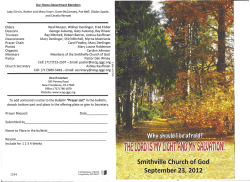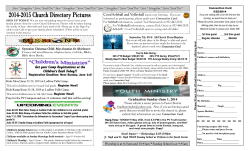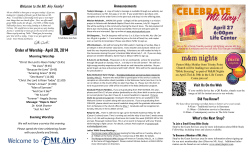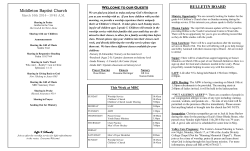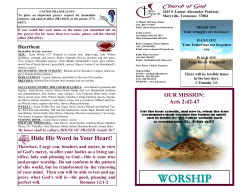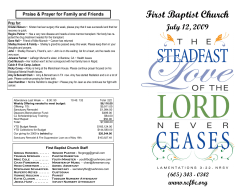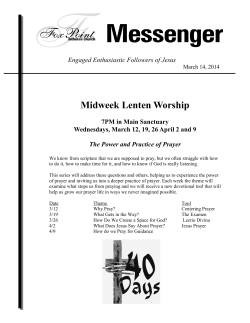
Children’s Church: A worship service by Dick Gruber Item 714-205
Children’s Church: A worship service by Dick Gruber Item 714-205 Making C h i l d r e n’s C h u r c h a Worship Service As a children’s pastor, Sunday school teacher, or church-time helper, you have the responsibility to train children in the way they should go. God has given us to prepare the saints for works of ministry, for the edifying of the body of Christ. We are to treat children with a Christlike respect and love them as Christ loves us. Our job is one of reaching, preaching to , and setting an example for children so that they can find their place in service to the Lord. We reach children through special evangelistic services. Kids crusades, neighborhood outreach programs, or special Sundays can be used to bring children of all ages to Jesus Christ. We preach to children the whole Word of God. It is through the preached Word of God that much growth takes place in children as well as adults. The method used in preaching to children may be different but the message is constant. Children are put under our teaching so that they may learn more about the Word of God and how to apply it to daily living. We set an example though our consistent Christian life in and out of church. I have been involved in three different kinds of children’s church programs. These all have good points and can be effective in their proper settings. I. The Boss Hog Sunday Morning Side Show CHARACTERISTICS 1. Paid staff member doing it all 2. No lay participation 3. Well organized (if the minister is organized) 4. Consistent quality (This works well if the minster is constantly learning.) II. The Alpha & Omega Amateur Hour CHARACTERISTICS 1. Many minds working harmoniously 2. Lots of lay participation 3. Variety of faces and methodology (This works well if there is a good M.C. to tie the program together.) III. Flash and the Five Reflections CHARACTERISTICS 1. Pastor with apostles (lay staff) 2. One mind with many extensions 3. Atmosphere of orderliness (This works only if the director is well organized.) All three of these can be used for God’ glory. Take a look at what you are doing and evaluate the effectiveness of it. No matter what kind of children’s church you have, it should be just that A CHILDREN’S CHURCH. Children are a heritage of the Lord. We are exhorted in Scripture to teach them His commands, writing them on walls, doorposts, puppet faces, and talking about them everywhere we go. We are to prove our love for Jesus by forbidding them not to come unto Him, by feeding His lambs, and by not squelching their spirit of praise. God loves children. Jesus placed an importance on the care and growth of His little ones. He touched them and blessed them. As workers in the church, we have the children for about 1 to 5 hours a week. It is important to use this time properly. Teachers must have contact with the child’s parents. The job of training children must start in the home. The church is a resource center for parents and should affirm the teaching that takes place in the home. With this in mind, it is important to recognize the responsibility of children’s workers to minister with and to the parents. Children are not the church of tomorrow, they are today’s church. Children’s church is a valid worship experience. REMEMBER: This is a church service—every service challenges service. This is the Body of Christ—everybody is active in the body. These are Saints—every saint is a participant. The children’s church is the assembling of God’ little people together for the purpose of meeting with each other and meeting with God. Meeting with each other: – Testify – Edify – Fellowship Meeting with God: – Worship – Prayer – Ministry of the Word Is your children’s church a circus or a service? Why do we have a children’s church? 1. Gospel truths taught on their level. 2. Worship with peer reinforcement. 3. To know church is an exciting center of love. Methods for children’s church THE PROGRAM No matter what kind of children’s church you run or the age-group you work with, there must be a program. Each children’s church program should have four basic parts. 1. Worship 2. Giving 3. Preaching 4. Prayer The key to each of these areas is to find the most effective expression of each as it relates to the theme of the day. THEME OR AIM Every service must have a central them or aim. This is the concept that you are trying to teach that day. In children’s work, you must stick to one concept in each service. Don’t throw scriptural themes about like so much garbage. With great care and prayer a them should be chosen for each service. Every part of that service must then accent this them. You want the children to go away knowing what you talked about. I. HOW TO PICK A THEME 1. Pray: Seek God's face. What does He want your kids to know? 2. Search the Scripture: Find key scripture verses dealing with the message. Theme may be born in a scripture passage. Even in a setting where printed children’s church material is used, you must pray for God’s direction. You must search the scripture. Material, such as that prepared by Gospel Publishing House, gives you a them, key scripture portions, and many practical helps. It does not contain a message for your children. Prepared programs are launching pads for a flight through a message born in God’s heart and delivered by you to your kids. God desires to do something special in every child’s life, every week. This cannot be accomplished if you do not grow beyond the boundaries set by these curriculums. Use these materials as the tools they were meant to be. Add to them and personalize them. Create an excitement befitting the call that God has placed on your life and ministry. Remember, a quantity of Scripture in the area you are covering this week, if meditated upon, will give you Godly creativity, and new insight. Excitement In every part of your children’s church program, excitement is the key to success. We teach the children that it is exciting to serve Jesus. Children’s church is EXCITING, not fun. It can be fun, but it should always be exciting. We serve a living, exciting Saviour. The children need to experience this concept. Church should be the most exciting place in a child’s life. The Bible should be the most exciting book. You should be the most exciting person they meet. You are God’s person for those kids. Children’s church is the most important hour of the week. If you are a dead-pan the rest of the week, it better not carry over to Sunday morning. Get hyped up! Get all excited! Some Sunday I have to hype myself up. How can you do this? 1. 2. 3. 4. 5. 6. 7. Look in the mirror and laugh. Run around the church. Cheer for Jesus Pray for the children by name. Dream/visualize/expect results Tell the kids you’re excited. Quote the genealogies. (?) Let’s look at the four factors that constitute an exciting, 1. 2. 3. 4. BALANCED children’s church program. Worship Giving Preaching Prayer worship Hem your blessings with praise, lest they unravel. PRAISING GOD IS AN ABSOLUTE IN RECEIVING HIS There are many ways to incorporate praise in the children’s church program. One of the best ways to lead children in praise is through music. BLESSINGS ON YOUR CHILDREN’S CHURCH SERVICE. Children are strongly influenced by music. Songs will cause emotional, physical, and spiritual response in children. The world uses music all the time. The key is to use it for God’s glory! Here are some songs I use in worship with children. I Can Run Through a Troop Clapping Our Hands Come Bless The Lord Father, I Adore You God Is So Good In Moments Like These Know Ye Not I Love Him Better Every Day In The Name Of Jesus Peace Like A River Seek Ye First Alleluia I Love You Lord Lord, I Want to Love You More God’s Not Dead This Is The Day Jesus Lifted Me Rejoice In The Lord Always He Is Lord Thou Art Worthy My wife leads in worship while I play the piano. Some use taped backgrounds. IT IS IMPORTANT Songs are chosen that will fit in with the theme. We usually start with the action songs and move to the slower more worshipful type choruses, but feel free to do as God leads. When we started emphasizing worship, a great deal of our discipline problems faded. When children become aware of God’ presence, even the disruptive child will be touched and calmed. TO NOTE THAT THIS IS A WORSHIP TIME NOT JUST SONG SINGING. Discipline Four most common types of discipline problems. I am sure you know them, but here they are. 1. Squirmin’ Herman – Hyped Ville, the kid that ate 10 pounds of sugar for breakfast, can’t sit still, always goes to the bathroom. 2. Boisterous Betsy – Disrupting for no reason, gives wrong answers for a laugh, needs attention, rowdy. 3. Tommy Talk Alot – Smart, speaks up our of turn but always has something good to say, preaches to the kids around him. 4. Danny Dreamer – Space Case, still sitting on the second verse of a action song, always staring off somewhere, unintentional problem. Deal with the following four D’s and it will affect the discipline problems. 1. 2. 3. 4. Discomfort – pews with cracks, temperature, smells Distraction – wasp, marching band Disinterest – you need to be exciting Disturbance – children, assistants If you are in control of the four D’s then this equation is true: EXCITEMENT X WORSHIP = GODLY ORDER Many children’s churches have order by the sword. God desires an orderly service and worship is the vehicle which will bring this to pass. Worship is not taught. It is… – cultivated – encouraged – ignited Worship through song. Worship through testimonies. Worship through praise breaks. Experiment with different forms of praise; clapping, shouting, quiet, hands raised, dancing, singing, etc. We encourage children to raise their hands and praise God with their whole heart. Peer pressure can be used for God's glory. Create an atmosphere of expectancy. Make it the “IN” thing to praise and magnify the Lord. Giving I teach tithing and giving of offerings to children. It is so important for children to learn the principles of giving at an early age. Their faithfulness in this area will open the windows of blessing to them in other areas of their lives. So I preach Malachi 3:8-10. I also make the giving time a joyful experience. Many children think giving is a chore. WHY? BECAUSE MOM AND DAD DO. I have seen many adults miss out on the blessings of God because they were hung-up with giving. The children’s church tithes and offerings do not amount to much, but then neither did the widow’s mite. GIVING PROJECTS We have had some projects to encourage giving in children’s church. These are geared to teach the children about… 1. Giving beyond the tithe. 2. Giving cheerfully. 3. The money going to God’s work. EXAMPLES: Fill a cider jug with change and purchase something you need for children’s church with the money. (TV/VCR, decorations for the room, or door prizes) Give to missions, you may be able to buy puppets or supplies for a missionary that your church supports. Have a “Fishing For Men” weekend. The money in the fish bowl can be used to pay for gospel films and prizes for a special evangelistic outreach. Boys and Girls Missionary Crusade is a natural! Children should be taught that the money given goes to God’s service. Many times Christian workers say, “Let’s give our money to Jesus.” The offering is taken and the bags are put behind the puppet stage. Some of the children are wondering if God lives in the puppet stage, since that is always where the pastor puts the offering. Tithes are brought into the storehouse to be used in the work of the Gospel. Try to emphasis how the money is used for God. Preaching Every children’s church service must include the preached Word of God. It is through the preaching of the Word that all of the great revivals of history began. Jesus preached the Word and we should also. All visual methods are included in the preaching portion of the children’s church service. Some of these are listed below. Object Lessons Bible Stories Scripture Pictures Costume Presentation Chalk Talks Ventriloquism Pantomime Video Presentations Drama/Skits Pray for creativity in your preaching. God will give you new ways to use old methods. Remember, the message is the most important part of the method. Do not sacrifice the message because of your zeal to try a new method. Pray for a message and pick your methods to accent it in the best way. Let’s cover some of the preaching methods, or visual arts and their application in the children’s church situation. OBJECT LESSONS One of the most effective ways to teach spiritual truths is the object lesson. What is an object lesson? An object lesson is simply using a common article easily recognized by the child to teach a spiritual truth. Jesus used object lessons. Matthew Luke John John John 22: 17-22 13: 18-19 12: 24 15: 1-9 11: 25-44 A common question asked of me is, “Where can I find object lessons?” The best places to find object lessons are: 1. Object lesson books 2. Bible 3. Your imagination I believe that you can use anything to teach an object lesson. I have taught lessons with potatoes, donuts, water, balloons, comb, hats, cards, cubes, keys, dolls, doors, gloves, chairs, mail, nails, and bubble gum. Pray for creativity in your object lessons. Even when you use one from a book, you will want to add your own experience to it. I try to make up my own whenever I can. You will be able to make your own as God enables you. A good object lesson is made up of these parts: 1. Scripture & Theme 2. Object 3. Relate the two We do not want them to remember the method only. Therefore the object of the object lesson is to help them remember the message. If an object lesson is properly presented, then the children will remember the lesson whenever they see the object throughout the week. When getting ready to present object lessons or any visual sermon, it is important to use the three P’s: Pray, Prepare, & Present. STORY TELLING Story telling is a great method because of the vivid imagination of children. Painting pictures through the words of a story is a talent that can be developed with practice. Every children’s worker should endeavor to become a good story teller. The children at your church are told stories every day. In school, on TV, at home, and in play they are listening to or telling stories. Since stories are such a normal part of childhood, you must become the most exciting story teller they know. Don’t make your costume so flashy that it distracts form the gospel message. There are different ways to tell a story. The most common and perhaps the most difficult way is simply standing and telling it. Many people think this method will be easier. But to stand and tell a story takes a great deal of expression and many hours of practice. That is why I suggest the following methods in story telling: 1. 2. 3. 4. 5. 6. Person and puppet telling and acting Children acting while you narrate Using pictures or slides Costume character Puppet spectacular You act out all parts Stories found in books may not relate to your children. You can change the story using the plot that is there. Make the characters and situations understandable to the children you minster to. Jesus told stories effectively. They were a tool used to bring spiritual truths to life for the people around Him. SCRIPTURE PICTURE The Romans used the rebus as a game. Rebus is the art of creating riddles with words or syllables depicted by symbols or pictures that suggest the sound of these words or syllables. In children’s pastors circles, we call this the Scripture picture. In a scripture picture, the words or syllables of the scripture verse are sounded out and pictures representing the words are drawn. For years, Sunday school teachers have taught the memory verse of the day this way. Children have learned these verses well enough to win the prize of the day, only to forget the verse by the next sunday. My objective in the scripture picture is not that they learn the verse word for word. My desire is that every child know the concept behind the scripture verse. So I emphasize the meaning of the verse and the pictures burn it into their memory. Methods that can be used to teach scripture pictures are: 1. 2. 3. 4. 5. Drawing pictures or word on balloons Tag board puppets Black construction paper & white chalk Flannel board Act out the sounds COSTUME PRESENTATIONS A foundational principle to all we have talked about is that children learn more of what they see than what they hear, and even more when they do it. Costume presentations can be done by you or by the children themselves. Children love to see the message of the gospel visualized in this way. You do not have to be elaborate in your costume presentations. some of the most simple costumes have been successful for me. I have been Moses, Superman, Peter, a carpenter, clown, fisherman, soldier, scientist and an old man.Costumes have ranged from an entire wardrobe with full dramatic make-up to a simple pair of glasses. Some suggestions for what to do while in costume. 1. 2. 3. 4. 5. Be sure the method is necessary. Emphasize a theme. Keep it simple (sometimes best). Add to it your Godly creativity. Be ready to change: - roof may cave in - move with the Spirit - children may become bored - child may have a different concept 6. Be versatile! PRAYER Every part of the service should lead up to this point. The prayer time, altar call, starts at the beginning of the service. The prayer time is a time of commitment, dedication, and action. Although the prayer time is not always the best indication of the results of your service, it is a good time to pray with the children individually. Children should have the same kind of prayer experience in church as they have at camp once a year. Four different ways to make your prayer time exciting and varied are: 1. Altar Call–raise hands or walk to the front 2. Altar Service–come down front or all stand or kneel 3. Prayer at chair–kneel or sit while workers work the room 4. Small Groups–assign kids to areas, list requests, & worker leads God can move in your children’s church. Encourage your children to meet God during the prayer time. Give the children ample opportunity to pray. One of the tragedies in children’s ministries is the interrupted ending. You know the case. Mrs. Doksansky bursts into your prayer time looking for little Zelda. She bumps into a few folding chairs and hurriedly drags her screaming daughter out of the room. The result of this is devastation to your prayer time. Arrange the schedule so that you have about 20 minutes of prayer time before the expected dismissal time of the adult service. Then if you have extra time, you can quiz the children over the lesson of the day or sing songs or play some Junior Bible Quiz (JBQ). Every service must have a plan. Following is a commonly used children’s church plan. Sunday April 29, 2002 Theme for today: Forgiveness Key Scriptures: 1 John 1:9 Scripture Picture: 1 John 1:9 Opening: Rules, theme, welcome Worship: Songs Giving: Special Scripture picture: Puppet with flannelboard Object lesson: Bible story: Publican & Sinner Puppet special: Chalk talk: Prayer time: Review time: Remember to plan your children’s church with the four parts in mind: worship, giving, preaching, and prayer. With these in balance, and God on your side, your children’s church will be life changing, inspirational, and a power builder in the lives of children. Ideas for use in Children’s church 1. Every now and then send a letter or award of appreciation to each child letting him know you are glad he came to children’s church. 2. Explain how to use the Bible and how to take care of it. Let the children hold and use a Bible while you are explaining about it. You may want to present those who don’t have a Bible with one at this time. 3. A secret message can be given to each child as he leaves to go home. The message can be an announcement of what’s going to happen in children’s church the next week. Be sure to include the key to crack that secret message. 4. Invite adult church leaders to come to your sessions. Explain what they do in the church. Ask questions like: “What do you do in church?” “Do you think it’s important?” Be sure to let the children ask questions as well. Have the person give a devotional or pray for the children before leaving. consider inviting ushers, deacons, elders, minister of education, minister of music, assistant pastor, piano or organ player, choir member, Sunday school superintendent, special ministries workers, and the custodian, as well as heads of various service groups. 5. If you would like to emphasize missions, the Boys and Girls Missionary Crusade (BGMC) can help. Request a packet of helps from them at 417-862-2781 or write them at 1445 Boonville Avenue, Springfield, MO 65802. 6. Keep track of your prayer requests by making a chart of requests and answers. 7. When you pray for someone who is sick, send him a card saying you prayed for him or her in children’s church. The text of the card can say something like: “We want you to know that a prayer request was made in your behalf, and we prayed for you this morning (date) in our children’s church service.” (signed—church’s name and address) Appoint someone to secure the address and mail out the cards. People will appreciate your prayers. 8. Sing songs, hymns, and choruses that are sung in the adult worship service. This helps familiarize the children with the activities of the adult services. 9. Keep a notebook file of what you do each Sunday. This file could include what story you used, what activities were done, what songs were sung, who prayed, and attendance. You should also include pupil response and suggestions or recommendations for future improvement. 10. Make installation and dedication of children’s church workers a special time. Recognize the workers at least twice a year. 11. For Christmas, have a sharing tree where the children can bring a new or like-new toy. As Christmas approaches, these toys can be shared with other children or perhaps day care center. 12. To create an interest in missions, you might dress up in the costume of another country or ask the children to come in costume. 13. Ask the children to come dressed as their favorite Bible character or object. 14. Spend one whole day with an emphasis on music and singing. You can have class partic ipation, individuals, groups, puppets, etc. singing. 15. Sometime during the summer you might want to have an all night lock-in where children can stay overnight. You can have special programs, skits, games, films, lots of food, and special times together. 16. Honor your workers. Select one person each month to receive special honor. Present the honor in front of the children to let them know how you feel about the workers. 17. Sing some scriptural choruses that have been put to music. Let the children look up the references in their Bible. 18. If additional rooms and personnel are available to you, consider having special elective classes for smaller groups of children. These classes should be short-term (2-6 weeks). The children in these classes can worship with the entire group and then at a specified time leave for their classes. Special classes can be conducted on water baptism, doctrine, preparation to attend the adult service, music, special craft or research projects, being a new Christian, Bible study, a study of prayer, or learning more about the work of the Holy Spirit. 19. Decorate your classroom to fit your lesson theme for the day’s teaching. 20. When missionaries or other special people come to your church, ask your pastor if they can come talk at children’s church prior to the time they are to speak to the adult congregation. You may need to rearrange your children’s worship service but the rewards will be great. 21. Explain how to use and hold a hymnbook. Let the children actually use one to sing a song. 22. Vary your room arrangements whenever possible. The change in scenery helps with discipline problems. 24. Pray for our missionaries in your children’s church services. Once a month select a specific missionary and pray for that person and his family in each service. You can select a missionary your church supports or the Division of Foreign Missions or the Division of Home Missions can help you with names. These divisions can also supply you with pictures of the various personnel. you can take the individual picture, make a photographic plate of it, and print it on a sheet of paper to be passed out as a reminder to each child. 25. Have an appreciation day for your workers. 26. Develop a monthly point sheet for helpers. Honor the helper with the most points. 27. Have the kids sponsor a child from a children’s home or an adult in a nursing home. 28. Bible Ping-pong is a game used to teach children the books of the Bible. One child starts with Genesis and points to another child who must then give the second book. Continue until someone misses. Divide the children into two groups, Keep score or go until one group completes the entire list. No one goes twice until everyone has had a turn. 29. Have a contest to see who can say the most Bible verses or read the most chapters in the Bible. Have a McDonald’s party or a get-together in honor of the winner. 30. Have the children go through the steps of going to the mission field. Discuss their need to graduate from high school, college, etc. You might also discuss the work missionaries do. 31. Have a “Christmas Around the World” children’s church program. You can divide the kids into groups and these groups can be rotated from area to area to do crafts, play games, or even watch a filmstrip. You can also sing a variety of Christmas songs from around the world. 32. Put offerings toward special projects. For example, your children may adopt a missionary’s child or children. From the offerings, you may buy the child a new outfit. You could possibly borrow a child mannequin from a department store, and as money come in, outfit the doll with the clothes you are going to send. Be sure to get the child’s correct sizes before you send the package. 33. Visualized songs and choruses are helpful means of learning difficult songs. Use poster board (18” x 24” or larger) and hand draw pictures or cut pictures from magazines to illustrate the songs. A number of these songs can be purchased from the Gospel Publishing House for use with smaller groups of children. 34. Give a “Tour of the Holy Land.” This would take several weeks to complete. For example, one week you might stop at Nazareth and discover events which took place there. Many different learning activities can be used for most biblical cities. Slides from those who have toured these areas would be of value to you also. 35. Invite parents to come and relate what type of work they do and tell why it is important to God’s kingdom. 36. Involve your pastor in children’s church activities whenever possible. When the church has special speakers, why not ask your pastor to visit your sessions? Let him talk to the children and let them ask him questions. He is, after all, their pastor too and one day they will be in his services in the sanctuary. 37. You might try reading Bible related stories to the children occasionally. “To be continued” stories will add interest and result in consistent attendance. 38. Use stories which involve the whole group. In Noah and the Ark, for example, after you select all the characters (both people and animals) you can use the remaining children to make the various kinds of sound effects (rain, laughing, yelling for help, etc.). 39. Object lessons help children remember Bible concepts. 40. Consider having an open house one Sunday after church. 41. Try different kinds of contests between different groups. Contests for offerings, visitors, Bible brought or read, the bast-behaved, largest attendance, quietest, loudest, etc. can be played. Children can be divided into teams in the following ways: according to school grades, those with birthdays before July 1 vs. those with birthdays after July 1, those wearing certain colors, different colors of hair colors of eyes, or those in one section of the room vs. those in another. 42. Have children act out various parts of a story. 43. Choose different children each month to serve as ushers, pray for each other, collect the offering. Use older children to give testimonies, sing, and share their talents. 44. Allow children to perform short skits. have a worker choose the needed number of children at the start of the program and then practice during the preliminaries. 45. Have the children write to a grandpa puppet, asking him questions about God and the Bible. Grandpa can read their letters and then answer the questions. Use a mailbox for the children to put letters in. 46. If you do not have musical experience, have someone prerecord the music and then play it back. 47. If video equipment is available, you might videotape people whom you’d like to have in Sunday school but who can’t be there on Sunday. Then you can play back their message to the kids. 48. A balance scale can be used for an offering contest. 49. Keep a record of all the things you’ve done in children’s church. It might serve as a reminder of something to do later on. 50. Counsel on a one-to-one basis with children who have indicated a desire to accept Christ as their Saviour. 51. Set up various display tables and allow the children to examine the contents. 52. Allow the children time to go to the rest rooms before you begin your children’s church program. Once you’ve started, do not allow them to leave except for emergencies. 53. If your church has a children’s library, feature a book either once a month or every few weeks. You might also want to allow the children time to browse through the library before they go home. 54. Bible Tic-Tac-Toe can be played using questions from the Bible story. 55. When special events take place in adult worship, consider bringing your children to these meetings. 56. If you have a discipline problem with your children, give a happy face sticker to those children who are being good. Your helpers can pass out the stickers while you are teaching the children. The happy faces can then be turned in for a small treat at the end of children’s church. If you can’t afford the happy face stickers, any kind will do. 57. Have Bible characters (members of the congregation dressed in biblical costumes) come into your children's church and tell their stories. Moses, Joseph, David and Goliath, Samson, Paul, or the shepherds in the field could be use. 58. When children come to children’s church feeling sick, have the other children gather around and pray for them. 59. Use shadow puppets to present the Bible story. 60. In order to give children’s church workers a chance to go to morning worship and to allow children to be there too, you might consider having every seventh Sunday as a time for a united service (parents and children). 61. Have a yearly birthday party. This can be done at Christmas time or during the summer months. Send each child a candle during the week urging them to bring the candle and place it on a birthday cake. 62. Teach special classes on prayer and intercession. 63. Start a monthly newsletter and send it to the children. 64. If you are having problems with behavior, you might use the following idea: Decide upon a set of rules that you want the children to keep. Assign each rule a specific number of penalty points. Then have a contest. Each child gets 50 points for being present, 10 points for bringing a Bible, 25 points if he joins in and participates in children’s church, 25 points for cooperation, and 25 points if he does not break a rule. Each time a rule is broken, subtract its assigned penalty points. The contest can run 4-7 weeks. A prize can be awarded to those children reaching a set point level. 65. Make some signs which have “yes” written on one side and “no” written on the other. During the day, pass out the paddles, half to boys and half to girls. Have these children come to the front of the group. Then ask some questions about the lesson. Have the children hold up what they feel is the right answer. Count the number of right answers and add up the scores. 66. The Junior Bible Quiz program and cards can be used successfully in a children’s church program. Some churches select 10 questions for the children to learn each week. The next Sunday they are quizzed over those 10 and the ones they have previously learned. For information on the JBQ program, contact the Children’s Ministries Consultant, Sunday School Promotion and Training office, 1445 Boonville, Springfield, MO 65802. 67. There are times when memory work will be required of your children. Use this time for a period of challenge between the boys and girls. Write single words on pieces of cardboard. Glue flannel strips to the back of the cardboard. Scramble the words of the verse. Select a boy and a girl to attempt to unscramble the verse. See who gets done in the shortest length of time. Another version is to use two flannel boards and two matching sets of words. Then let each group compete together. Allow the children to give their leader help and inspiration. 68. If you are not familiar with the children’s names, have them wear name tags until you learn their names. 69. Explain the order of the church service. What should the child expect? Let him examine a copy of the adult church bulletin. 70. Have a promotion day for those children who are going into adult worship. Make it a special time. 71. A “Happy Birthday” poster can be placed on the wall with the names of those children who are having birthdays that week. 72. Recognize children’s birthdays. A child’s birthday is more important to him or her than any other time of the year. A little card which says “Happy Birthday and thanks for coming to children’s church” would be cherished by the child. Try to make the children feel special, even if it does take a significant amount of time. Try to hand write the message and include their name and something special about them. 73. For older children, a time can be set aside for the teaching of music and music theory. 74. You could prepare a special children’ church bulletin to let the kids know what’s taking place that day or during the week. This could be passed out as the kids come in or as they leave. if you don’t have time to do the work, let the children do it. 75. Have a special day to present a Bible to each child of a certain age. 76. Study the different aspect of worship. Such things as prayer, worship, praise, songs and their history, music, communion, water baptism, and the baptism in the Holy Spirit could be topics discussed. You may want to study questions like why we have a pastor, why we have an altar, and why we sing songs in church, etc. 77. You may like to have a resource tool called the “Elementary Sunday School Teacher Idea Book”, item number 714-200. It lists a variety of ideas you can adapt to a children’s church program. It is available from Gospel Publishing House for $5.00. Call 800-6414310. Gathering Resources Before a children’ church program is begun, its third priority (after setting goals and staffing) should be the gathering/listing of resources. In this case resources include more than materials. Besides visual aids, list such things as people, ideas, pictures, audio-visual equipment, overhead transparencies, puppets, and scripts (for dramas, skits, and puppets). Once you know what you have you can then determine what you need and make a reasonable budget request. Listed below are several companies you can write for a list of materials. I suggest you ask that a catalog be sent. From the catalog, you can decide what material you would like to explore further. Let me also suggest that written materials (curriculum, skits, plays, etc.) from firms separate from your church denomination be examined for doctrinal correctness before being use. Quarterly materials Radiant Life, Assemblies of God, 1445 Boonville, Springfield, MO 65802 Other Children’s church materials Gospel Publishing House, 1445 Boonville, Springfield, MO 65802 Train Depot, 5015 Tampa West Blvd., Tampa, FL 33614 Standard Publishing, 8121 Hamilton Ave., Cincinnati, OH 45231 Children’s Church Inc., PO Box 773, Corona, CA 91720 Child Evangelism Fellowship, Warrenton, MO 64093 Scripture Press Publications, 1825 College Ave., Wheaton, IL 60187 Caraway Street, C/O Ron Solomon, 14455 Ammons Street, Denver, CO 80215 Visual Aid Resources Big & Bright Bible Stories, Rt. 2, Box 258-A, Marionville, MO 65705 Bible Visuals, Box 4842 T, Lancaster, PA 17604 Children Evangelism Fellowship, Warrenton, MO 64093 Betty Lukens, PO Box 178, Angwin, CA 94508 Versitron Visual Arts, Box 8932, 4821 Golden Ave., Riverside, CA 92505 Overhead Transparency Stories, Songs, Supplies M.A. Religious Designs, 1917 Xerxes Ave. North, Minneapolis, MN 55411 Milliken Publishing Company, 1100 Research Blvd., St. Louis, MO 63132 David Winchell, Heritage Village Church, Charlotte, NC 28279 Faith Venture Visuals, PO Box 423, Litity, PA 17543 Balloons, Magic, Supplies Schmidt’s Sales, 302 E State, Onoway, MI 49765 Puppets, Scripts, Resources Gospel Publishing House, 1445 Boonville, Springfield, MO 65802 Puppets From One Way Street, PO box 2398, Littleton, CO 80161 The Son Shine Puppet Company, PO Box 6203, Rockford, IL 61125 Puppet Productions, Inc., PO Box 82088, San Diego, CA 92138 House of Puppetry, PO Box 9269, Little Rock, AR 72209 Puppets, Puppets, PO Box 2128, Dallas, TX 75221 Organizations The Fellowship of Christian Puppeteers, PO Box 220601, Charlotte, NC 28222 The Fellowship of Christian Magicians, Box 385, Connersville, IN 47331 The Puppeteers of America, Noven Drive, Fenton, MO 63026
© Copyright 2025
